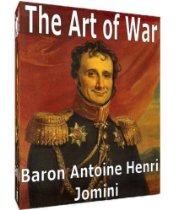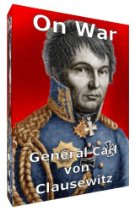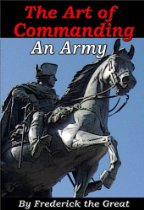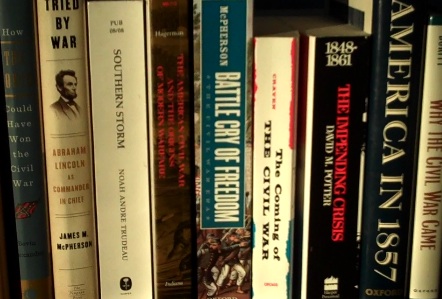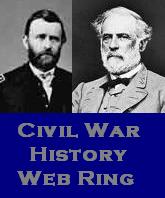Posts Tagged ‘On War’
New Kindle 2 Book Acquisitions – Military Strategists
I’ve added some titles to my Kindle 2. I own print versions of most of these but want to use the text-to-speech capabilities of the Kindle 2 to review them again while mobile.
- Title: The Art of War
- Author: Antoine de Jomini, Capt. G.H. Mendell, Lieut. W.P. Craighill
- Format: Kindle Edition
- File Size: 1387 KB
- Publisher: MyEclectica.com (March 14, 2008)
- Sold by: Amazon Digital Services
- Language: English
- ASIN: B00162BZDW
- Title: On War
- Author: Carl con Clausewitz
- Format: Kindle Edition
- File Size: 1088 KB
- Publisher: MyEclectica.com (February 22, 2008)
- Sold by: Amazon Digital Services
- Language: English
- ASIN: B00156DW1C
- Title: The Art of Commanding An Army
- Author: Frederick the Great
- Format: Kindle Edition
- File Size: 107 KB
- Publisher: MacMay (November 26, 2008)
- Sold by: Amazon Digital Services
- Language: English
- ASIN: B001M5U5O8
- Title: With Frederick the Great: A Story of the Seven Years’ War
- Author: G. A. Henty
- Format: Kindle Edition
- File Size: 586 KB
- Publisher: LeClue (February 7, 2008)
- Sold by: Amazon Digital Services
- Language: English
- ASIN: B0013L9678
while
Written by Rene Tyree
March 8, 2009 at 11:01 am
Posted in Amazon Digital Services, Books, Clausewitz, Frederick the Great, Jomini, Kindle 2, Kindle Books
Tagged with Amazon Digital Services, Baron Antoine Henri Jomini, Capt. G.H. Mendell, Carl von Clausewitz, Kindle Books, Lieut. W.P. Craighill, Military History, Military Strategists, military strategy, On War, The Art of War, With Frederick the Great: A Story of the Seven Years' War
Jomini on the Nature of War – Part VII – Jomini’s Impact on Civil War Leadership
 This post continues the series of “Jomini on the Nature of War.” Part I: Introduction is available here, Part II: The Burgeoning Military Theorist here, Part III: The Founder of Modern Strategy here, Part IV: The Basics here, Part V: Lines of Operation here, and Part VI – The Conduct of War here.
This post continues the series of “Jomini on the Nature of War.” Part I: Introduction is available here, Part II: The Burgeoning Military Theorist here, Part III: The Founder of Modern Strategy here, Part IV: The Basics here, Part V: Lines of Operation here, and Part VI – The Conduct of War here.
Returning to Baron Antoine de Jomini (right), I wanted to explore the extent to which his strategies influenced those who held leadership positions during the American Civil War. A modest survey of the literature revealed some disagreement.
Historian James L. Morrison, Jr. in his article “Educating the Civil War Generals: West Point, 1833 – 1861,″ pointed out that exposure to Jomini came during “Professor Dennis H. Mahan’s [pictured below] course, Civil and Military Engineering and the Science of War which all First Classmen studied daily.”[i]
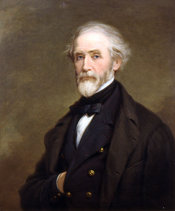
Dennis H. Mahan
Photo Credit: Wiki Commons
But only nine hours were given to the study of the science of war and Morrison contends that this was entirely too brief an exposure to have had any lasting impact. That said, he acknowledges that some alumni of the military academy studied Jomini thoroughly including Beauregard, Lee, Halleck, and McClellan.
“…The same cannot be said for the great majority of their colleagues who had neither the opportunity nor the inclination to continue their strategic studies after graduation. Probably Sherman was more representative of the typical graduate when he denied that Jomini had affected his thoughts or actions in the war.” [ii]
I’ll discuss some additional viewpoints in the next post.
A word on Dennis H. Mahan. A military theorist in his own right, Mahan was instrumental in developing the engineering-focused curriculum at West Point. Some may recall that he was the father of naval strategist Admiral Alfred Thayer Mahan. The elder’s obituary, which appeared on September 17, 1871 in New York Times here, reveals that Professor Mahan committed suicide by jumping in the Hudson River from the deck of the steamboat Mary Powell in such a way that he was hit by the wheel. He was apparently despondant about being forced to retire. A sad end to a remarkable career. Professor Mahan’s memoir is available online here.
Mary Powell, Queen of the HudsonPhoto Credit: Hudson River Maritime Museum
[i, ii] James L. Morrison, Jr., “Educating the Civil War Generals: West Point, 1833 – 1861,” Military Affairs, Vol. 38, No. 3. (Oct., 1974), pp. 109.
Written by Rene Tyree
April 2, 2008 at 8:54 pm
Posted in Alfred Thayer Mahan, American Civil War, Antebellum America, Archer Jones, Dennis Mahan, James L. Morrison, Jomini, Leadership, Lee, Maritime History, Military Philosophy, Naval History, Strategy, West Point
Tagged with Alfred Thayer Mahan, American Civil War, Baron Antoine-Henri de Jomini, Beauregard, Civil War, Dennis H. Mahan, Halleck, Hudson River Maritime Museum, James L. McClellan, Jomini, Lee, Mary Powell, McClellan, Military Philosophy, military strategy, New York Times, On War, Queen of the Hudson, Sherman, The Nature of War, West Point
Jomini on the Nature of War – Part VI – The Conduct of War
 This post continues the series of “Jomini on the Nature of War.” Part I: Introduction is available here, Part II: The Burgeoning Military Theorist here, Part III: The Founder of Modern Strategy here, Part IV: The Basics here, and Part V: Lines of Operation here.
This post continues the series of “Jomini on the Nature of War.” Part I: Introduction is available here, Part II: The Burgeoning Military Theorist here, Part III: The Founder of Modern Strategy here, Part IV: The Basics here, and Part V: Lines of Operation here.
Jomini cautions that there are a number of other circumstances that can affect the “nature and conduct of war” including that…
- “a state may simply make war against another state
- a state may make war against several states in alliance with each other
- a state in alliance with another may make war upon a single enemy
- a state may be either the principal party or an auxiliary
- in the latter case a state may join in the struggle at its beginning or after it has commenced.
- the theater of war may be upon the soil of the enemy, upon that of an ally, or upon its own.
- if the war be one of invasions, it may be upon adjacent or distant territory: it may be prudent and cautious, or it may be bold and adventurous
- it may be a national war, either against ourselves or against the enemy
- the war may be a civil or a religious war.”[i]
He insists that war should always “be conducted according to the great principles of the art; but [that] great discretion must be exercised in the nature of the operations to be undertaken, which should depend upon the circumstances of the case.”[ii] “A regiment should always fight in nearly the same way; but commanding generals must be guided by circumstances and events.”[iii]
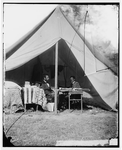
So the “principles of strategy are always the same,” but differences occur with the “political part of war, which is modified by the tone of communities, by localities, and by the characters of men at the head of states and armies.”[iv]
Jomini outlines these specific circumstances in a description of each type of war and the principles and rules to follow (or not follow) in every one. For example, in “Offensive Wars to Reclaim Rights,” he indicates that no rules can be laid down but to watch and to profit by every circumstance.[v] This leads to his conclusion that “war knows no rules.”[vi]
“Military science rests upon principle which can never be safely violated in the presence of an active and skillful enemy, while the moral and political part of war presents these variations. Plans of operations are made as circumstances may demand: to execute these plans, the great principles of war must be observed.”[vii]
[i] Jomini, Antoine Henri de. The Art of War, trans. by G. H. Mendell and W. P. Craighill., Special Edition, (El Paso: EL Paso Norte Press. 2005), 10-11.
[ii] Ibid..
[iii] Ibid.
[iv] Ibid., 13.
[v] Ibid., 12.
[vi] Ibid.,13.
[vii] Ibid.
Written by Rene Tyree
March 18, 2008 at 11:35 pm
Jomini on the Nature of War – Part V – Lines of Operation
This post continues the series of “Jomini on the Nature of War.” Part I: Introduction is available here, Part II: The Burgeoning Military Theorist here, Part III: The Founder of Modern Strategy here, and Part IV: The Basics here.
“Principles were guides to action, not infallible mathematical calculations.  The specific application of principles would vary with the thousand changing physical and psychological factors that made war ‘a great drama.’ Genius would defeat the military pendant, just as talent and experience would outdo the bumbling novice. But the principles themselves, whose truth is demonstrated by all military experience, could not be ignored without peril and, when followed, had ‘almost invariably’ (Presque en tout temps) brought victory.”[i]
The specific application of principles would vary with the thousand changing physical and psychological factors that made war ‘a great drama.’ Genius would defeat the military pendant, just as talent and experience would outdo the bumbling novice. But the principles themselves, whose truth is demonstrated by all military experience, could not be ignored without peril and, when followed, had ‘almost invariably’ (Presque en tout temps) brought victory.”[i]
Jomini’s arguments for “immutable ‘principle’ of war” rested on the concept of “lines of operation” by which he meant…
He identified two types of lines of operation, those that are:
[i – v] John Shy, “Jomini,” in Makers of Modern Strategy from Machiavelli to the Nuclear Age, ed. Peter Paret (Princeton: Princeton University Press, 1986), 154, 166.
Photo: Union entrenchments near Kenesaw Mountain, Ga., 1864. 111-B-531. The National Archives.
Map: First Manasas
Written by Rene Tyree
March 11, 2008 at 11:12 pm
Posted in John Shy, Jomini, Lines of Operation, Military History, Military Philosophy, Napoleon Bonaparte
Tagged with American Civil War, AMU, Baron Antoine-Henri de Jomini, Civil War, Clausewitz, Jomini, Lines of Operation, Makers of Modern Strategy from Machieavelli to the Nucl, Military Philosophy, military strategy, Napoleon, On War, Peter Paret, The Nature of War
Jomini on the Nature of War – Part I – Introduction

Baron Antoine-Henri de Jomini
I’d like to begin a series of posts on Baron Antoine-Henri de Jomini. I had the opportunity to study Jomini along with other military strategists in a previous course, Great Military Philosophers which you can read more about on the courses page here, and wanted to come back to that material to dive in a bit deeper in. Why Jomini you might ask and what has he to do with the American Civil War? John Shy, in an excellent essay on Jomini that appears in one of my favorite books, Makers of Modern Strategy from Machieavelli to the Nuclear Age, wrote that “three names that stand out in the formative period of modern military thought: Napoleon, Clausewitz, and Jomini.”[i]

Napoleon

Clausewitz

Jomini
Everyone has heard of Napoleon. Many familiar with history have heard of the Prussian Carl von Clausevitz. But Jomini remains largely unknown outside of the military. And yet, Shy contends, Jomini’s “influence on both military theory and popular conceptions of warfare has been enormous.” [ii] His theories were known by militarists in many countries and certainly in the United States both before, during and after the American Civil War. More to come…
[i], [ii] John Shy, “Jomini,” in Makers of Modern Strategy from Machiavelli to the Nuclear Age, ed. Peter Paret (Princeton: Princeton University Press, 1986), 144.
Photos are in the public domain. Source: Wiki commons.
Written by Rene Tyree
February 19, 2008 at 1:27 am
Posted in Books, Civil War, John Shy, Jomini, Military Philosophy, Peter Paret
Tagged with American Civil War, AMU, Baron Antoine-Henri de Jomini, Civil War, Clausewitz, Jomini, Makers of Modern Strategy from Machieavelli to the Nucl, Military Philosophy, military strategy, Napoleon, On War, Peter Paret, The Nature of War
